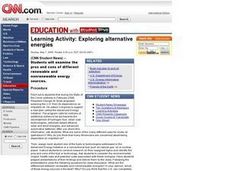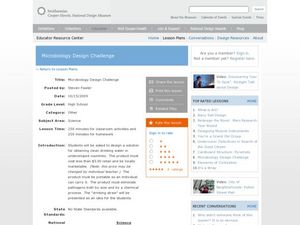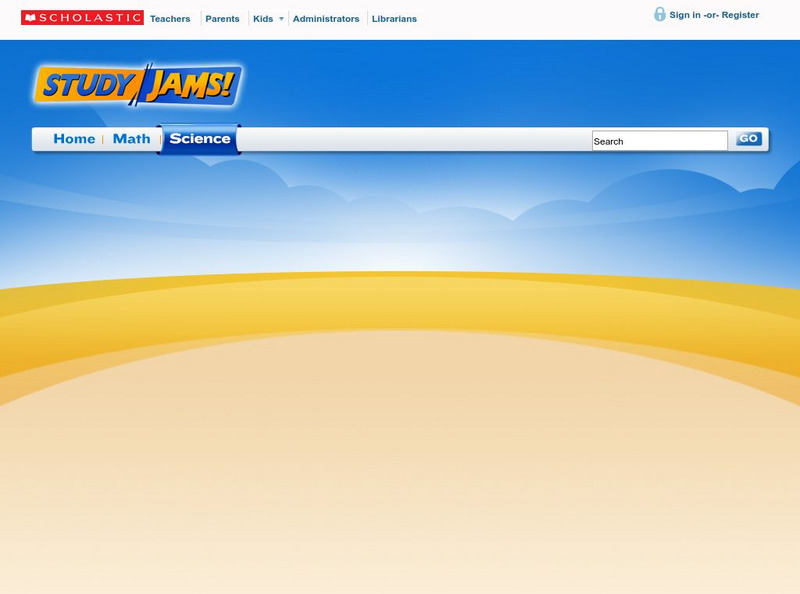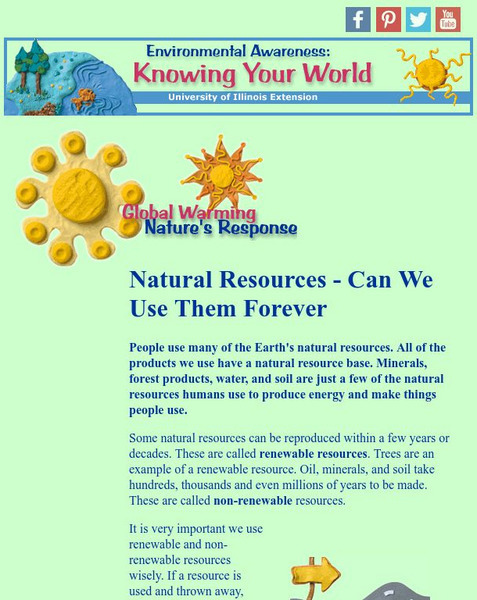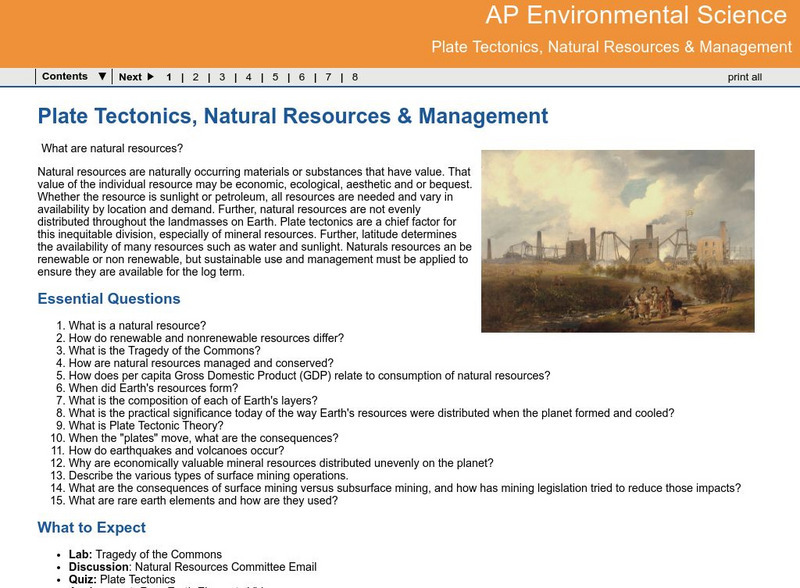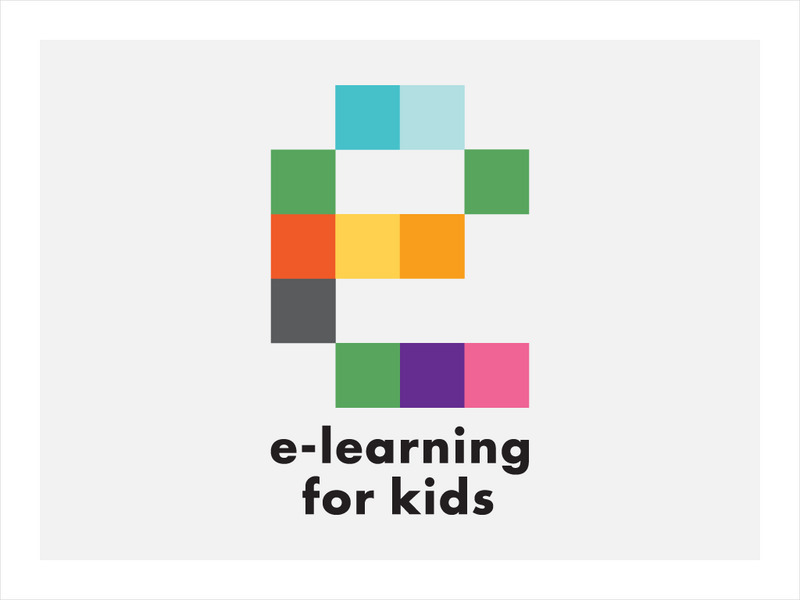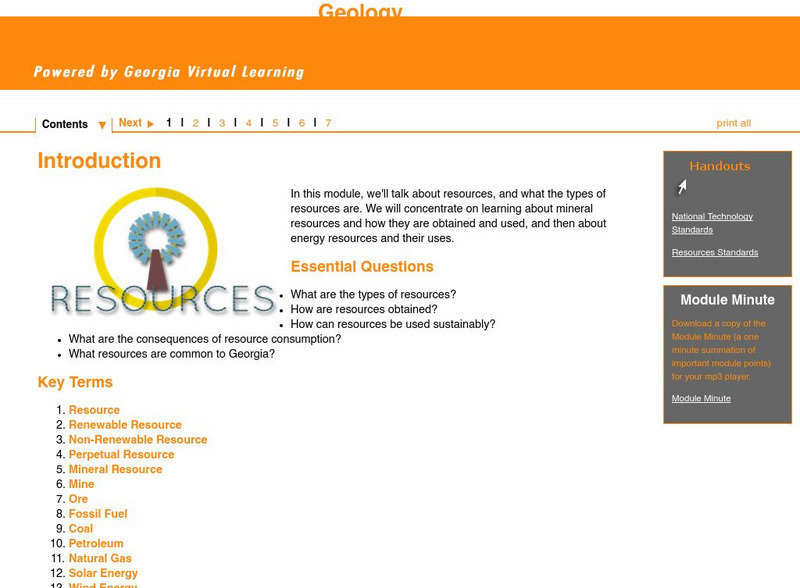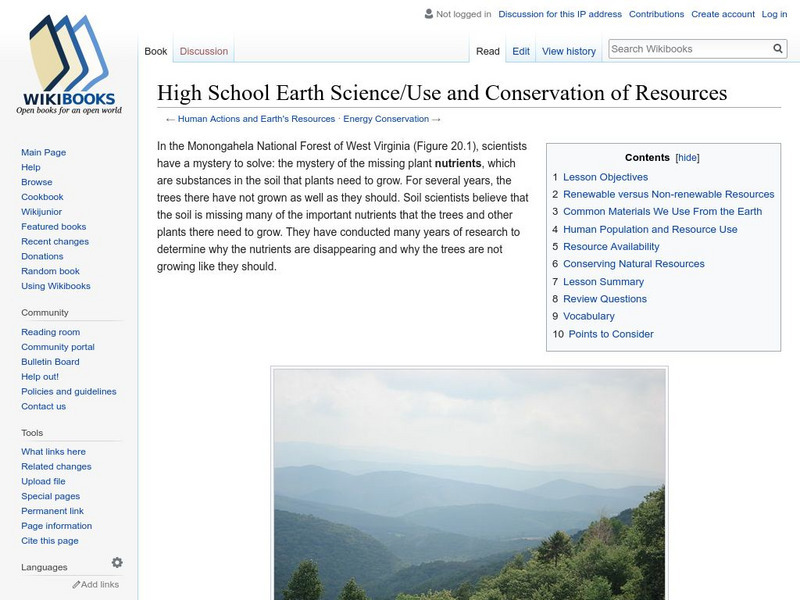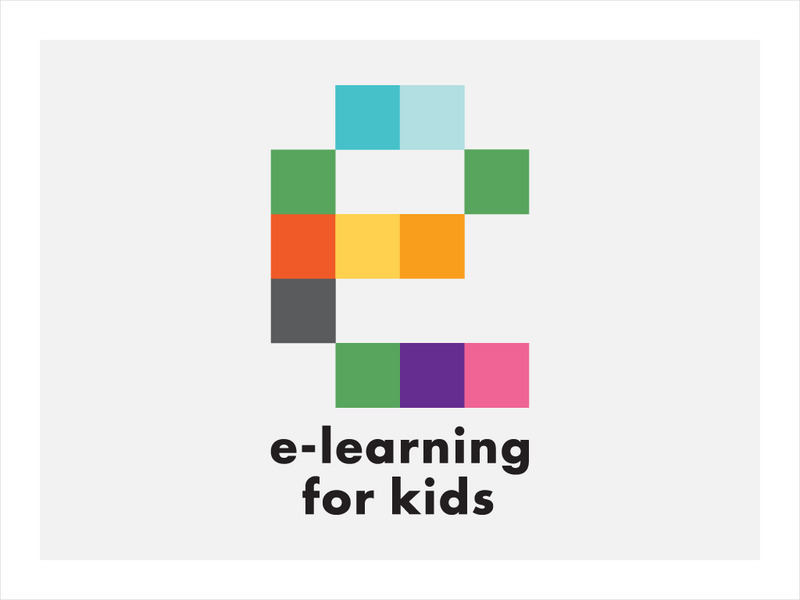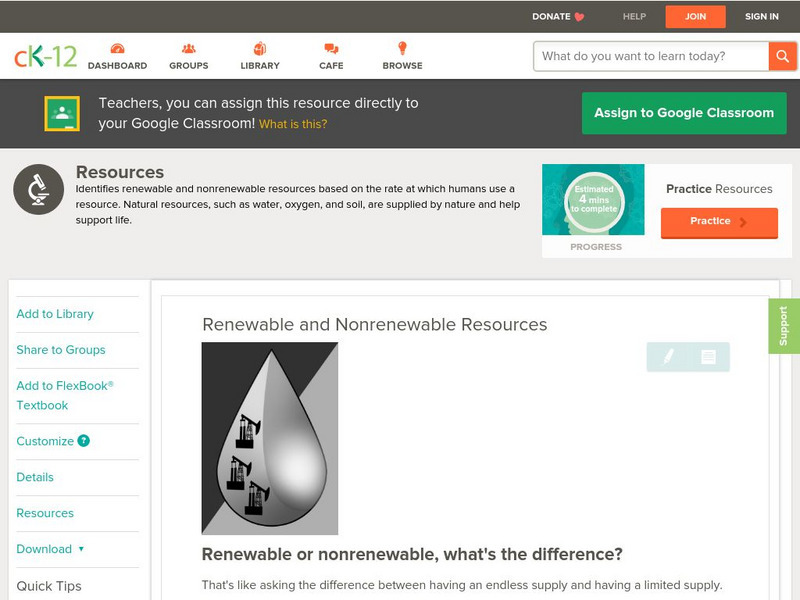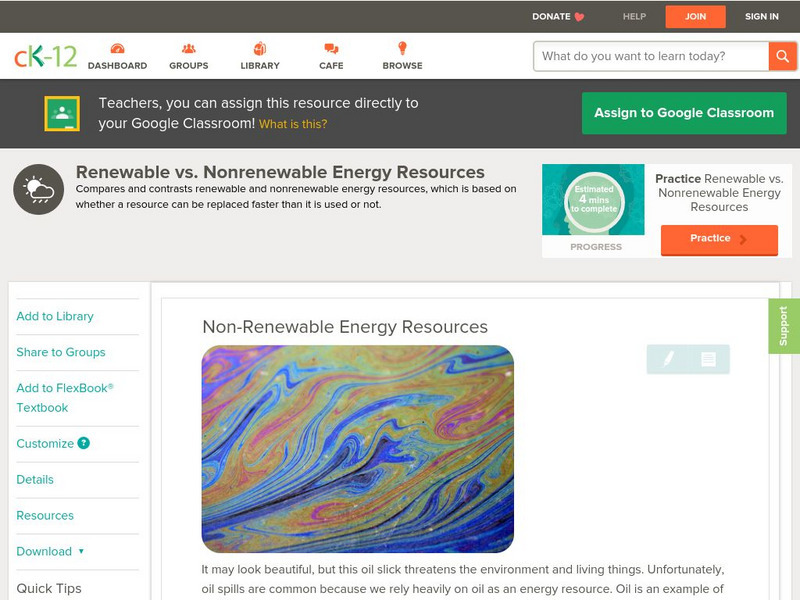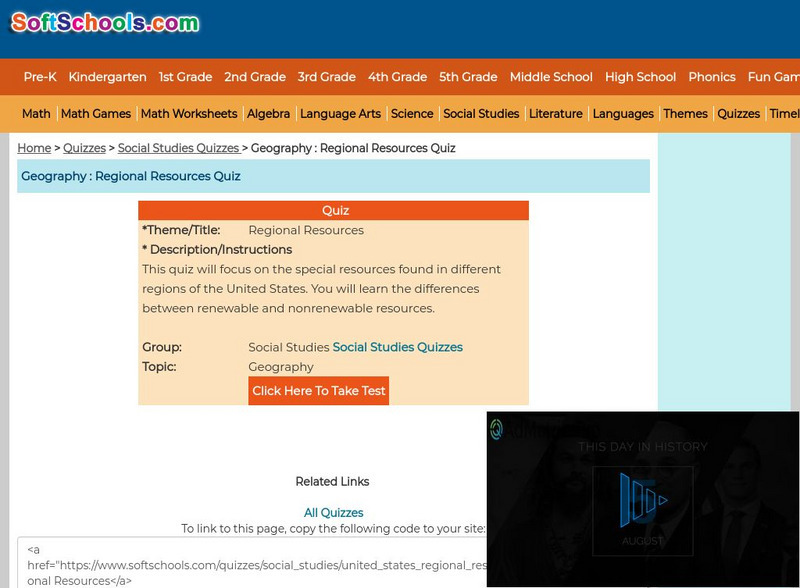Curated OER
Exploring Alternative Energies
Young scholars research various forms of alternative energy sources and examine the pros and cons of each type. They discuss American oil dependence and the Bush administration's policies regarding this issue.
Curated OER
Microbiology Design Challenge
Students discover dangers to human health by researching what's in our drinking water. In this water purification lesson, students discuss the conditions of water in undeveloped countries and why it is unsafe to drink....
Curated OER
Acid Rain: Where Have All the Rainbows Gone?
Students study the pH scale and sources of acid precipitation. For this acid rain lesson students complete a lab on acid rain then complete a handout.
Curated OER
Wildlife Habitat
Students examine habitats and describe their elements. In this wildlife habitat lesson students study the factors that affect habitat and write a short report.
eSchool Today
E School Today: Your Cool Basics on Natural Resources
Looks at the two categories of natural resources, what they are used for, their distribution around the world, threats to natural resources, recycling and composting, and conservation.
Scholastic
Scholastic: Study Jams! Science: Energy, Light and Sound: Natural Resources
A slideshow and a short quiz on natural resources, the difference between renewable and nonrenewable resources, and the impact humans have on the Earth's natural resources.
Other
Biology Discussion: Natural Resources: Depletion Reasons, Types and Conservation
Discusses how the the natural resources of the world are being depleted at an alarming rate, and that humans depend on them for their survival. Elaborates on four main causes of resource depletion, and initiatives that could help to...
CK-12 Foundation
Ck 12: Biology: Natural Resources Study Guide
Understand what natural resources are, and how important they are to Earth.
University of Illinois
University of Illinois Extension: Schools Online: Knowing Your World: Natural Resources
This brief article emphasizing the importance of renewable and non-renewable resources urges readers to appreciate and not waste the earth's natural resources. Following the article, there is an activity, a "Mineral Search," through...
Georgia Department of Education
Ga Virtual Learning: Ap Environmental Science: Plate Tectonics,natural Resources
Through interactive activities and readings, students learn that natural resources can be renewable or nonrenewable, but sustainable use and management must be applied to ensure they are available for the long term.
E-learning for Kids
E Learning for Kids: Science: Denmark: What Are Natural Resources and Why Are They Important?
Learn about natural resources, both renewable and nonrenewable, and the impact humans have on the natural world.
Other
Peak Oil: Non Renewable Resources Depletion Effects
A collection of graphs, tables, and diagrams that illustrate the global impact of natural resource depletion. (Published 2014)
NC State University
Ncsu: What Will Be Left of Earth's Non Renewable Resources?
An interactive graph that predicts how many years until more than two dozen natural resources (e.g., chromium, oil, tin, coal, etc.) are depleted, based on current production rates or production that grows each year. Use the slider at...
US Energy Information Administration
U.s. Eia Energy Kids: Nonrenewable Energy Sources
This resource provides information about nonrenewable energy sources. There is specific information about each of these energy sources, and lots of maps, charts, tables, and graphs to further the understanding.
Georgia Department of Education
Ga Virtual Learning: Geology Resources
In this interactive tutorial you will learn about geological resources. Learn what the types of resources are and concentrate on learning about mineral resources and how they are obtained and used, and then about energy resources and...
CK-12 Foundation
Ck 12: Renewable Versus Non Renewable Resources
[Free Registration/Login may be required to access all resource tools.] Discusses the differences between renewable and nonrenewable natural resources. Includes study and review questions, and links to additional resources.
Other
Wikibooks: High School Earth Science/use and Conservation of Resources
Begins with a description of a case of missing plant nutrients that have been affecting Monongahela National Forest in West Virginia. Lists some of the benefits to humans of the natural resources in such a park. Then explains the...
E-learning for Kids
E Learning for Kids: Scotland: What Is the Difference Between Renewable and Nonrenewable Resources?
Looks at types of natural resources that can be used for energy, and the difference between renewable and nonrenewable energy sources.
CK-12 Foundation
Ck 12: Biology: Renewable and Nonrenewable Resources
[Free Registration/Login may be required to access all resource tools.] Identifies renewable and nonrenewable resources based on the rate at which humans use a resource. Natural resources, such as water, oxygen, and soil, are supplied by...
Nature Conservancy
The Nature Conservancy: Renewable Energy
In this lesson, students explore solar and wind power-two important renewable energy sources.
Other
Florida Dept. Of Education: Conservation of Renewable and Nonrenewable Resources
In this learning module, students learn to differentiate between renewable and nonrenewable resources, and identify resources that fit into each category. It explains the environmental effects of using nonrenewable resources, such as...
CK-12 Foundation
Ck 12: Earth Science: Non Renewable Energy Resources
[Free Registration/Login may be required to access all resource tools.] What nonrenewable energy resources and fossil fuels are and how they form, and the drawbacks of using nonrenewable energy resources.
TeachEngineering
Teach Engineering: Environment
Through 10 lessons and more than 20 hands-on activities, students are introduced to the concept of an environment and the many interactions within it. As they learn about natural and human-made environments, as well as renewable and...
Soft Schools
Soft Schools: Regional Resources Quiz
Choose the correct answer for each of the ten multiple choice questions to evaluate your comprehension of the special resources found in different regions of the United States.


